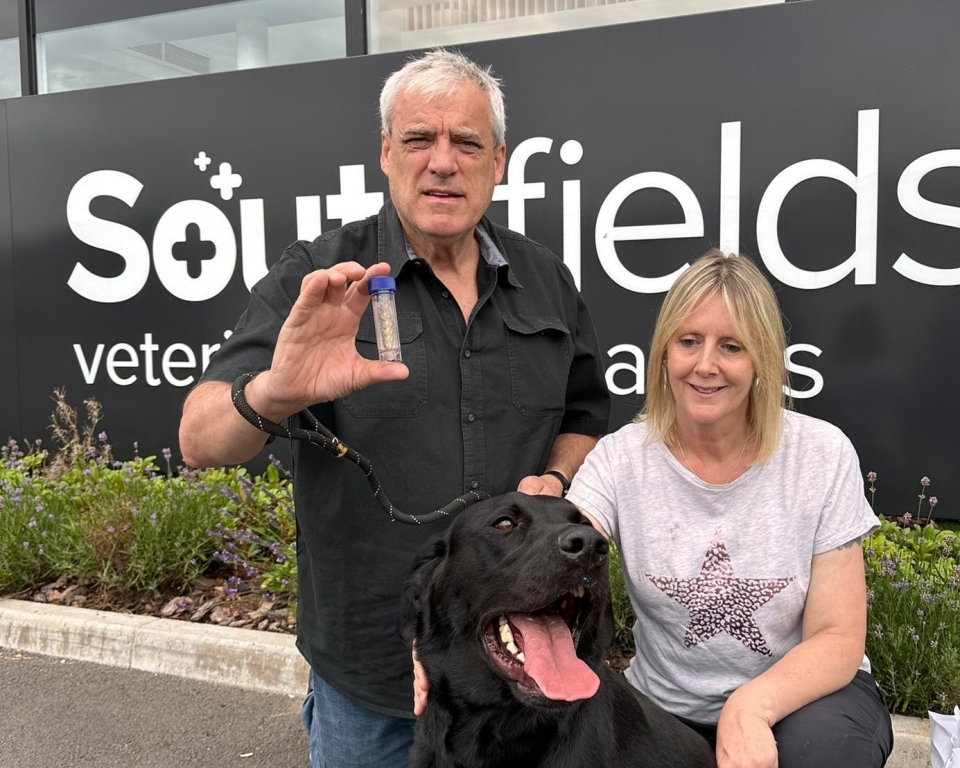
Two-year-old Labrador Buddy required lifesaving surgery at Southfields Veterinary Specialists in Basildon after inhaling an ear of wheat which the vets described as ‘one of the biggest grass seeds we’ve seen’.
Essex Vets Remove Entire Lung Lobe To Save Dog Who Inhaled Wheat
A two-year-old Labrador who inhaled an ear of wheat has undergone lifesaving surgery at an Essex animal hospital.
Buddy, who is now making a good recovery, was operated on at Linnaeus-owned Southfields Veterinary Specialists in Basildon, who described the wheat as ‘one of the biggest grass seeds we’ve seen’.
Grass seeds, which can enter a dog’s body in a number of ways, can cause abscesses or serious infections, and in the more serious cases, such as Buddy’s, need surgery to remove.
Buddy’s medical emergency started when he was running in a field of wheat on his birthday and returned to his owner with a cough.
His cough continued for a couple of days and he became lethargic and went off his food, so worried owners Mick and Kim Groarke from Church Langley in Harlow took him to their local vets, who took an x-ray and found some abnormalities on his lung, indicating a foreign body in his airways.
A CT scan of Buddy’s chest confirmed an ear of wheat, which was unable to be removed via a minimally invasive endoscopy because it was stuck in the bronchus the wrong way round.
Open chest surgery was the only option to stop Buddy from deteriorating and he was referred to Southfields for the emergency operation, which involved removing the entire affected lung lobe, as the wheat had moved further into the affected area.
Mick said: “Natalie, one of the vets, sat us down and explained everything to us very clearly and honestly.
“Now he’s had the operation, he is getting back to himself and is eager to get the exercise he is used to having.”
Henry L’Eplattenier, soft tissue surgery specialist at Southfields, said: “Buddy had swallowed one of the biggest grass seeds we’ve seen.
“Most grass seeds are usually too small to be detected on a CT scan, unlike in Buddy’s case. He was lucky the cause of the problem was seen early on and could be removed before it had time to cause more serious damage.
“Buddy recovered well from the operation and he was allowed home two days after surgery.”
Grass seeds of various types commonly cause problems in dogs if they penetrate inside the body. The most common entry points are the mouth, the airway, the ears and the skin of the feet.
Once inside the body, these seeds can migrate through the body, especially if they are barbed, as the barbs only allow movement in one direction.
They then cause abscesses in various locations in the body, such as behind the eyes or in the lungs, or they can cause serious infections in the entire chest with an accumulation of pus inside the chest compressing the lungs.
Southfields, which moved into its state-of-the-art £16 million Basildon hospital last summer, offers specialist services such as anaesthesia and analgesia, cardiology, dentistry, dermatology, diagnostic imaging, exotics, internal medicine, neurology, oncology, ophthalmology, orthopaedics, radiation and soft tissue surgery.
For more information, go to www.southfields.co.uk or search Southfields Veterinary Specialists on social media.
More from Linnaeus Group
- Mars Veterinary Health publishes 2025 Science Impact Report highlighting global advances in pet health
- AMVS specialist gets to heart of puppy's problem
- Garston Veterinary Group team earn BVRA recognition
- Chihuahua Lola loving life after 'challenging' spinal surgery
- Vets save therapy cat's life following road accident

 3 years ago
3 years ago  1557 views
1557 views

 17 hours ago
17 hours ago